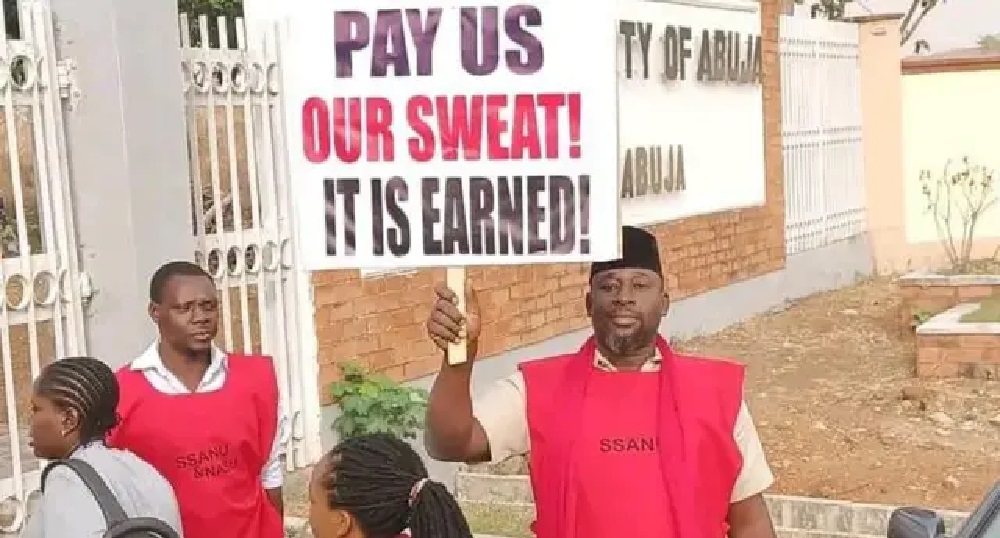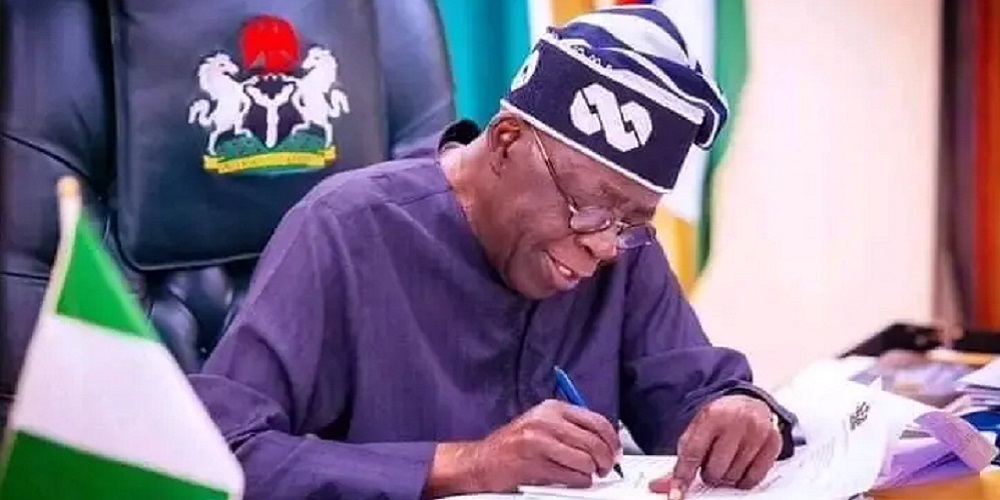News
Anxiety As Nigerian Universities Workers Begin Strike Today

The Joint Action Committee of the Non-Academic Staff Union of Educational and Associated Institutions and the Senior Staff Association of Nigerian Universities has vowed to indefinitely shut down all activities in universities across the country from Monday (today) when they embark on an indefinite strike.
A statement made available to The PUNCH on Sunday and signed by National President, SSANU, Mohammed Ibrahim, General Secretary, NASU, Prince Peters Adeyemi, said the ultimatum it gave the Federal Government over its withheld salaries expired Sunday midnight.
The unions are demanding, among others, the payment of the four-month withheld salaries, improved remuneration, earned allowances and implementation of the 2009 agreements with the government.
The Federal Government had through the Ministry of Labour and Employment invoked the ‘No Work, No Pay’ policy when the four university-based unions embarked on a prolonged strike in 2022.
Last October, President Bola Tinubu directed the payment of four of the eight months withheld salaries for the academic staff. It was finally paid in February.
The directive was silent about the non-teaching staff, raising concerns as to their fate. The unions also described the directive as selective and kicked against it.
The unions subsequently wrote to the government, gave ultimatums, protested and held warning strikes, but their four-month salaries are still being withheld.
The statement, called on all the state-owned universities to also incorporate their local demands into the strike action as appropriate.
“Your strict compliance and adherence to this directive is mandatory for all NASU and SSANU branches in Federal and State Owned Universities as well as Inter-University Centres,” it read.
It also said, “The last circular of the Joint Action Committee of Non-Academic Staff Union of Educational and Associated Institutions and Senior Staff Association of Nigerian Universities titled, “Latest Development in Respect of the Withheld Four Months’ Salaries” referenced JAC/NS/VOL.III/32 dated 21st October 2024 refers.
“The circular under reference gave seven days to the Federal Government to do the needful in respect of our demands for payment of outstanding four months’ salaries and implementation of the Memorandum of Understanding (MoU) sighed with the Federal Government on 20th August, 2022 which expires midnight of Sunday, 27th October, 2024.”
It recall that at the last National Peaceful Protest of JAC of NASU and SSANU held on July 18, 2024 at the Unity Fountain Abuja, an ultimatum of 10 days was given to the Government to pay the withheld salaries to avoid shutting down of activities in the Universities and Inter-University Centres with no consequence.
“It is quite appalling that we have issued several ultimatums thereafter with no positive result from the government, it is therefore obvious that Government is not positively disposed to our rightful and legitimate demands in spite of several interactions, dialogues, exchange of correspondences and assurances of payment all to no avail.
“We have exercised considerable and prolonged patience, allowing multiple deadlines to pass without receiving a satisfactory response to our demands by the Government,” the statement, “This is to direct all our members in the Universities and Inter-University Centres throughout the country to hold a joint congress in their respective campuses on Monday, 28th October, 2024 and proceed on an indefinite, comprehensive and total strike action as no concession should be given in any guise.”
SSANU members are in charge of major facilities on campuses, which has sparked fears of a standstill of activities if the strike begins today.
“Our members are in charge of water supply, electricity, communication, internet supply, security, finance, if they pay this money tomorrow (today), we will call off the strike,” SSANU boss Ibrahim told The PUNCH.
The strike holds as President Tinubu directed outgoing Minister of Education Prof Mamman Tahir to hand over office to the incoming Dr Tunji Alausa on Wednesday.
Efforts to reach the Federal Ministry of Education for reaction to the industrial action by both unions were unsuccessful as at the time of filing this report.
In March, the union embarked on a one-week warning strike after its letter to the education minister and the Chief of Staff to the President were not responded to. In July, the unions ordered a nationwide protest to call the government’s attention to their plight.
After the July meeting, the spokesperson for the education ministry, Folashade Boriowo, said the withheld salaries had been forwarded to the highest level of government and were receiving attention.
Earlier this month, the union gave a seven-day ultimatum over the withheld salaries but the action also failed to achieve the desired result.
“It is quite appalling that we have issued several ultimatums thereafter with no positive result from the government, it is therefore obvious that the government is not positively disposed to our rightful and legitimate demands in spite of several interactions, dialogues, exchange of correspondences and assurances of payment all to no avail,” the unions said in the statement.
Last month, the unions announced plans to commence an indefinite strike if their outstanding salaries were not paid within three weeks, demanding, among other things, the payment of four months’ withheld salaries, improved remuneration, earned allowances, and the implementation of the 2009 agreements with the government.
In a statement jointly signed by SSANU boss Ibrahim, and the General Secretary of NASU, Adeyemi, the unions said the Federal Government was given a 10-day grace period, which expired on July 26, 2024, to pay the four months of outstanding salaries to university staff, with the threat of shutting down universities and inter-university centres if the payment was not made.
However, six weeks after the grace period elapsed, the government has still not fulfilled this obligation.
“It is in respect of the above that we write to inform the government of the decision of the National JAC of NASU and SSANU at the meeting held on 12th September 2024, that the government be given another three weeks’ final ultimatum from Tuesday, 17th September 2024, to pay the four months’ withheld salaries and also implement the agreement reached with it on 20th August 2022, failing which our members may be forced to embark on indefinite strike action at the expiration of the ultimatum.”
The unions noted that they were aware that President Tinubu had approved the payment of the outstanding four months’ withheld salaries, but that this was not implemented by relevant government officials.
“We have it on good authority that Mr. President has given approval for the payment of the four months’ withheld salaries as far back as 18th July 2024 at the national minimum wage meeting with the leadership of NLC and TUC.
“Of recent, we also heard that Mr. President has given approval for the actual release of the payment. Regrettably, nothing has been forthcoming despite all the approvals,” both unions stated in September.
Credit: PUNCH
News
Tinubu approves procurement thresholds for MDAs

President Bola Tinubu has approved the immediate implementation of the revised procurement thresholds for Ministries, Departments and Agencies [MDAs].
The approval is based on the recommendation by the Director General of Bureau for Public Procurement [BPP] Dr Adedokun Adebowale, in alignment with the President’s Renewed Hope Agenda.
The details of the implementation guidelines will be provided by the DG of the BPP on Thursday, May 15, 2025.
News
EFCC Removes Foreign National, Ellie Bitar, From CBEX Wanted List

The Economic and Financial Crimes Commission (EFCC) has removed a foreign national, Elie Bitar, from the wanted list for Crypto Bridge Exchange (CBEX) fraud.
The anti-graft agency had on April 30 declared Bitar wanted over the alleged fraud perpetrated on the CBEX trading platform.
The EFCC included Bitrar’s name in the wanted notice it published across social media platforms.
The agency, in a now deleted post on its X handle signed by its Head of Media and Publicity, Dele Oyewale, said Bitar’s last known address was in the Lekki Phase 1 area of Lagos State.
However, in a statement issued on Wednesday EFCC spokesperson said Bitar’s name has been removed from the wanted list, citing the availability of new information.
“Ellie Bitar of CBEX Solutions Ltd., who was earlier declared wanted, has since been removed from the list owing to new information that does not support his inclusion in the wanted person’s list.
“The Commission is making good progress in its investigations. Law enforcement agencies across the world are collaborating with it in tracking and arresting all the wanted persons. The EFCC will not relent in bringing every actor involved in the fraudulent dealings to book,” the statement read in part.
According to Oyewale, the anti-graft agency is “gaining important ground” in the search for the eight persons declared wanted over the CBEX fraud.
Several videos online had shown some Nigerians raising the alarm over the loss of their funds to the CBEX scheme when it reportedly crashed in April.
As part of its investigations into the matter, the EFCC had declared eight persons wanted over their alleged involvement in a fraudulent scheme linked to the online trading platform.
The Federal High Court in Abuja also granted the agency’s request to arrest and detain persons found promoting the CBEX scheme.
News
Tinubu Endorses Establishment of Forest Guards to Counter Terrorism, Banditry
President Bola Tinubu has approved the establishment of forest guards and commencement of their employment to secure the 1,129 forests in the country.
In a statement on Wednesday, presidential spokesperson, Sunday Dare, revealed that the President directed that the forest guards are to be well trained and armed to perform their duties, which is essentially to flush out terrorists and criminal gangs hiding inside the forests for criminal activities.
According to Dare, the recruitment is a security collaborative effort between the federal and state governments.
“The office of the NSA and the Ministry of Environment have been directed to take charge and ensure full implementation,” he said.
The presidential spokesperson said thousands of young Nigerians are expected to be employed as personnel of the outfit.
“President Tinubu had warned terrorists that his administration would not surrender an inch of the country’s territory to terrorists, bandits, and other criminal gangs operating inside the forests. President Tinubu vowed that the country would take back its forests,” he said.
-

 News20 hours ago
News20 hours agoJust in: NNPC Cuts Petrol Price Amid Competitive Moves with Dangote Refinery
-

 News15 hours ago
News15 hours agoJust in: FG receives Wigwe’s helicopter crash report from NTSB
-

 Entertainment15 hours ago
Entertainment15 hours agoSAD ! Popular Nollywood actress, Monalisa Stephen is dead
-

 News18 hours ago
News18 hours agoSAD! Popular Broadcast Journalist Bukola Agbakaizu Slumps, Dies Before Afternoon Shift
-

 Economy24 hours ago
Economy24 hours agoCBN launches new platform, targets $1bn monthly diaspora remittances
-

 News24 hours ago
News24 hours ago19-Year-Old Candidate Commits Suicide over Low UTME Score
-

 News23 hours ago
News23 hours agoKano varsity shuts female hostel over immorality
-

 News15 hours ago
News15 hours agoJust in: Tinubu’s son Seyi, Tops Controversial List As Lagos Guber Race Ignites Political Wahala





